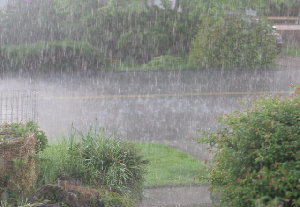- Home - News
- Polls
- Year In Review
- News Archive
- Crime & Punishment
- Politics
- Regional
- Editorial
- Health
- Ghanaians Abroad
- Tabloid
- Africa
- Religion
- Election 2020
- Coronavirus
- Photo Archives
- News Headlines
- Press Release
General News of Friday, 18 October 2019
Source: ghananewsagency.org
‘Lets make conscious efforts to collect rainwater to reduce flooding in Africa’- UNESCO Officer
Rainwater harvesting has been identified as a critical climate adaptation measure that could also help in addressing the looming water scarcity confronting Africa in the wake of climate change impact, some experts have said.
Also, the practice of concretizing spaces in homes, have been said to reduce the volumes of water that sips in to increase the water table underground, which feed the aquifers and most water sources.
“If people make conscious efforts to harvest rainwater, we could have volumes to cater for more than nine billion people in the world,” Ms Melody Boateng, National Professional Officer for Science, UNESCO Ghana Office, said in an interview with the Ghana News Agency in Accra, on the side-lines of the Climate Chance Summit Africa 2019, currently underway in Accra.
Ms Boateng said apart from the fact that rainwater was a useful source for domestic and industrial uses, harvesting and storing in mass levels could also help reduce the volume of flooding, which had become a big issue for many countries, including African countries.
She was speaking to the Ghana News Agency, after she addressed a UNESCO side-event, themed: “Strengthening Coordinated Water and Climate Actions in Africa”, held alongside the three-day Climate Chance summit, which is ending on Friday.
The second Climate Chance Summit Africa 2019, had gathered subnational, local governments and non-state actors in Africa, to discuss and strengthen coalitions in the implementation of adopted climate actions in Africa. Experts have identified the impacts of climate change in Africa as strictly connected to water as manifested through floods and droughts.
Available data say water supplies such as aquifers and lakes are shrinking or increasingly being polluted. Also, a 2019 study had indicated that about 90 per cent of all natural disasters were water-related while over the periods of 20 years, floods and droughts accounted for 53 per cent of all documented natural disasters, affecting 2.4 billion people, killing 168,000 and causing $662 billion in damage.
Ms Boateng explained that the UNECSO research and proposal had been that the other way to getting water apart from going underground was to harvest rainwater.
“So instead of letting the water runoff like we are doing these days in Ghana, we have to make conscious efforts to collect rainwater to aid our adaptation to dwindling water sources, droughts and even floods”.`
A UNESCO 2012 report have also revealed that by 2050, rising populations in flood-prone lands, climate change, deforestation, loss of wetlands and rising sea levels, were expected to increase the number of people vulnerable to flood disaster to two billion.
Ms Boateng said African countries, especially, facing water shortages as a result of climate change have a massive potential in rainwater harvesting as the rainfall contribution on the continent was more adequate to meet the needs of the current world population several times over.
She indicated that UNESCO, in partnership with UN Environment and others, had therefore, designed an app that would help gather data and aid households and institutions in countries to be able to measure and set up rainwater harvesting storages or systems to help collect and store rainfalls.
She said the app had been designed in English, French and Swahili languages for countries to download online, and use it to calculate the volume of water that could be harvested annually and build the appropriate storage facility for it.
Ms Boateng also expressed the concern that in the name of modernity, people have tended to build, cemented and concreted their home grounds and thereby, preventing rainwater to sip down into the water table underground, and allowing rainwater just to runoff into choked gutters and caused flooding, just at the instance of a little rainfall.
She urged people not to concretise all the spaces in “our homes so that, we get enough rainwater to feed the water table”.
Entertainment










